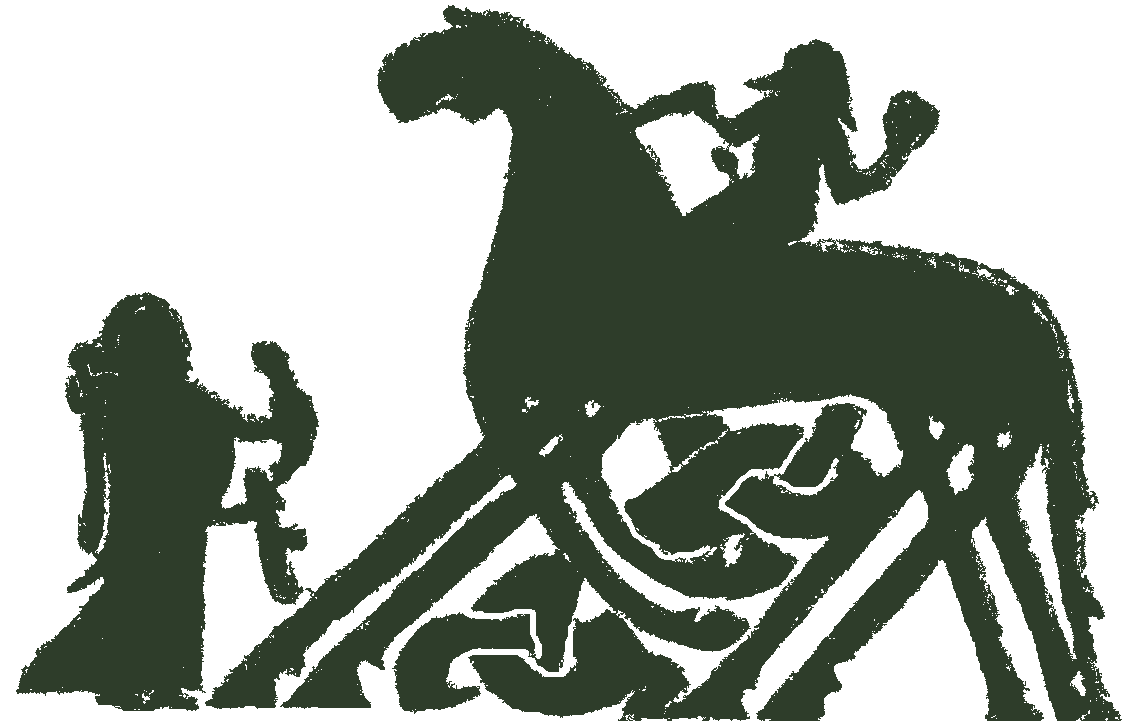3. The “Sources” Strand
This is not currently part of the peer-reviewed material of the project. Do not cite as a research publication.
The “Sources” Strand of the Pre-Christian Religions of the North project is an undertaking never before attempted in the study of Northern European mythology: a detailed survey of all extant sources – both textual and archaeological – describing the religious beliefs and practices of the peoples of Northern Europe before the arrival of Christianity, divorced from overarching analytical agendas.
One major difficulty facing students and scholars of the “heathen” religious systems of the North today is the huge range of confusing, sometimes contradictory, source data, surviving in forms as diverse as runic inscriptions, fantastic medieval literature, burial customs, legal documents, and artefacts (and sometimes people) apparently thrown into bogs as offerings to higher powers in the first thousand years after Christ’s birth. Indeed, the traditional division of the study of humanities into separate disciplines such as history, archaeology and literature has worked against any scholar being aware of – let alone able to access and work with – all the evidence available for any given aspect of pre-Christian religious beliefs or practices.
As such, the “Sources” Strand is intended to produce a reference work outlining the currently extant material relevant to the field, allowing textual scholars access to the vast array of archaeological material unearthed in the last fifty or so years (much of it virtually unknown to the scholarly community as a whole), and vice versa. The source data will be presented in two printed volumes, one covering textual sources, the other archaeological material, enabling students and scholars to find and examine descriptions and overviews of data from sources outside their discipline. The data itself – in the form of texts, translations, site data, maps and photographs – will then be made available in full in an online, free-to-access database accessible (through the medium of the internet) to interested parties anywhere in the world, which will also provide extensive primary and secondary bibliographies. This is intended to make the study of the pre-Christian religions of Northern Europe more accessible and easier to pursue, by reducing students’ and scholars’ reliance on acquiring (often expensive or out-of-print) books and reports through libraries and lending institutions, with all of the restrictions inherent in such a system. It is envisaged that the database will be designed and implemented by the editors and contributors of the Sources Strand, but that it will – after the completion of the project – be maintained and expanded by the staff of Snorrastofa, in order to allow the database to remain an up-to-date and dynamic tool at the forefront of research in multiple fields for the foreseeable future.
Throughout both the printed volumes and the online material, cross-referencing and indices will be provided to allow readers and users to understand the cultural and geographical contexts of the data, enabling researchers and students to gain a deeper understanding of the world in which the objects of their studies developed, and to guide those working outside of their primary field to related data they might struggle to access otherwise.
This strand of the Pre-Christian Religions of the North project is edited by a textual scholar expert in Old Norse written material (John McKinnell, of the University of Durham) and an archaeologist specialising in Iron-Age Northern Europe (Neil Price, of the University of Aberdeen), who are assisted by an expert on medieval Latin texts (Rudolf Simek, of the University of Bonn) and a specialist in Anglo-Saxon and Landscape archaeology (Sarah Semple, of the University of Durham) as well as their liaison to the Executive Board, Terry Gunnell (of the University of Iceland). As of 2012, they have been joined by an expert in digital humanities and database design (Tarrin Wills, of the University of Aberdeen). This group of editors will oversee the work of a dedicated group of academics and research assistants, as well as students and IT specialists tasked with the creation of the database, ensuring that it will not only significantly reduce the time and effort currently spent by researchers of every level in the simple acquisition of reliable editions, translations and reports, but will also actively aid in the analysis of such data through the presence of searchable texts and cross-referencing hyperlinks embedded within the database itself.
It is envisaged that material detailed by the “Sources” Strand will focus on, but not be limited to, evidence from the Iron Age to the middle of the sixteenth century – that is, roughly c. 100-1550 ad. The textual sources would primarily consist of:
- Old Norse Skaldic and Eddic verse
- Old Norse prose accounts – including sagas, histories, sermons, saints’ lives, etc.
- Scandinavian Latin sources
- Legal texts, cases, and provisions in codes of law
- Latin and vernacular sources from the British Isles and Germany
- Runic inscriptions in the Migration Age (from c. 400), the older and younger futharks (to c. 1100), in Old-English runes, and seemingly pre-Christian runic inscriptions in the post-conversion period
- Place- and personal names including references to pre-Christian religion in the Nordic countries, the British Isles and in German-speaking countries
- The accounts of Latin, Byzantine Greek and Arabic ‘outsiders’
- Latin sources from Germanic peoples settled in Italy
- Post-medieval and undatable evidence for Pre-Christian religion such as folktales, ballads, and folk customs and ceremonies.
It is our belief that the volumes and electronic database of the Pre-Christian Religions of the North project will prove an invaluable new reference tool not only for research conducted in the field, but also for the teaching of pre-Christian religions and related subjects, including the history of religion more generally, and the study of Northern-European history, literature, folklore and visual arts.
